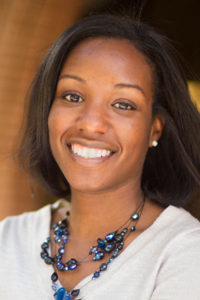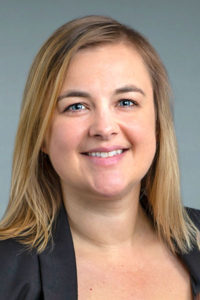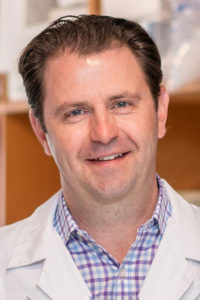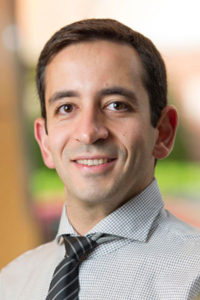NextGen Stars sessions to offer a bold, fresh look into the future of cancer research
The American Association for Cancer Research Annual Meeting 2021 will include three sessions spotlighting the work of the 2021 AACR NextGen Stars.
Designed to offer enhanced visibility to early-career scientists, the NextGen Stars program supports the professional development and advancement of those researchers selected. The research can be in any area across a variety of subspecialties.

For past recipients, AACR NextGen Stars presentations have offered a powerful professional boost at an important time in their careers.
Stacey D. Finley, PhD, said that the AACR highlights the work of rising stars at its Annual Meeting in a way that many professional societies do not. As a 2018 NextGen Star, Finley presented during a major symposium with leaders in her research area of systems biology.
“Highlighting the work of rising stars is very important. Doing so at a major annual meeting is not something that many professional societies do,” said Finley, Gordon S. Marshall Early Career Chair, associate professor, and director of the Center for Computational Modeling of Cancer, University of Southern California. “It’s usually the case that established investigators are prominently featured at major meetings. Allowing early-stage investigators to present their work to a broad audience is a unique and much-needed opportunity to gain exposure for their work, foster new interactions, and gain constructive feedback.”

For Amanda W. Lund, PhD, principal investigator, Laboratory of Lymphatic Immunobiology, NYU Langone Health, her 2017 NextGen Star experience provided a platform to advocate for her science and her laboratory team on a national stage. Including postdoctoral researchers and assistant professors in high-profile sessions also improves the meeting’s scientific diversity and encourages young investigators to ask questions and participate in the discussions. It also increases the likelihood that presentations have cutting-edge, emerging, unpublished data and bring new ideas to the forefront.
“Visibility on the national stage is key for trainee recruitment, which keeps our science going, recognition for invited review opportunities, additional presentation invitations, and future awards,” Lund said. “I think it’s clear that this early recognition set my program on a really exciting path, and allowed for more recognition by and engagement with the tumor microenvironment and tumor immunology fields.”

Ryan B. Corcoran, MD, PhD, said that early-career recognition from the AACR provided him with the motivation to push forward with research. Corcoran, director of the Gastrointestinal Cancer Center Program and scientific director of the Termeer Center for Targeted Therapies, Massachusetts General Hospital Cancer Center, and associate professor of medicine, Harvard Medical School, said that the personal and professional connections made with senior researchers through NextGen Stars and other AACR events have led to collaborations and opportunities to speak, share work, and serve on committees.
“The AACR has always provided an important vehicle for early-career investigators to connect with the broader research community as a key pathway to development as an independent investigator,” Corcoran said. “Indeed, many of the most important career connections I have made have come from interactions at AACR events.”
In 2018, being named as an AACR NextGen Star gave Samuel F. Bakhoum, MD, PhD, a confidence boost during the transition into becoming an independent investigator. Bakhoum, assistant member, Human Oncology and Pathogenesis Program, and assistant attending, Department of Radiation Oncology, Memorial Sloan Kettering Cancer Center, said that the program is a testament to the AACR’s investment in younger generations. It also encourages diversity in research, not only ethnic, cultural, and racial diversity, but diversity of thought that enriches the research community as a whole.

“Having the opportunity to get a sneak peek into what it feels like being independent faculty—speaking at seminars, speaking at plenary sessions, speaking in front of audiences—is incredibly important,” Bakhoum said. “I always tell my postdocs the best way to be a postdoc is to think like an independent faculty because it helps put you ahead of the curve and prepares you for what you’re about to face, and that’s what the AACR NextGen Stars program does.”
In the past, NexGen Stars have presented alongside leading scientific experts who are veterans of Annual Meeting presentations. This year, the 16 Stars will make their presentations and respond to live questions during three NextGen Stars Spotlight Sessions:
Genetics and Epigenetics
Saturday, April 10, 4 – 5:45 PM EDT
Chair: Karen E. Knudsen, Jefferson University
Andrew Aguirre, Dana-Farber Cancer Institute
Synthetic lethal interaction between the ESCRT paralog enzymes VPS4A and VPS4B in cancers harboring loss of chromosome 18q or 16q
Zeribe Nwosu, Rogel Cancer Center, University of Michigan
Identification of high priority genes for basic and translational pancreatic cancer research
Burcu Darst, University of Southern California
Multiethnic prostate cancer GWAS meta-analysis identifies novel variants, improves genetic risk prediction across populations, and informs biological mechanisms of prostate cancer
Debattama Sen, Dana-Farber Cancer Institute/Harvard Medical School
Disrupting enhancers within the core epigenetic program of exhaustion improves CD8 + T cell responses and enhances tumor control
Eneda Toska, Memorial Sloan Kettering Cancer Center
Epigenetic mechanisms of endocrine therapy response in breast cancer
Tumor Microenvironment, Metastasis, and Oncogenesis
Sunday, April 11, 2 – 3:45 PM EDT
Chair: Dafna Bar-Sagi, New York University Langone Medical Center
George Burslem, University of Pennsylvania
Addressing scaffolding roles of oncogenic kinases with targeted protein degradation
Moran Amit, University of Texas MD Anderson Cancer Center
Cancer takes a nerve: Loss of p53 drives neuron reprogramming in head and neck cancer
Pau Castel, University of California San Francisco
Oncoprotein duality in cancer and developmental syndromes: lessons learned from RAS GTPases
Sara Pedron, University of Illinois at Urbana-Champaign
Bioengineered tissue mimetic hydrogels to study brain tumor biology and screen therapeutics
Xin Jin, Broad Institute of MIT and Harvard
A metastasis map of human cancer cell lines
Immunology and Targeted Therapy
Monday, April 12, 1:30 – 3:30 PM EDT
Chair: Douglas T. Fearon, Cold Spring Harbor Laboratory
Anusha Kalbasi, University of California, Los Angeles
Orthogonal IL-9 receptor signaling reprograms T cells to obviate conditioning chemotherapy before adoptive cell therapy
Xuhui Bao, Duke University Medical Center
From cholesterol regulation to tumor suppression: Pcsk9 as a novel target for cancer immunotherapy
Yuxuan Phoenix Miao, University of Chicago
Decoding the stem cells-immune cell dialogues for cancer immunotherapy
Shruti Bhatt, National University of Singapore
Reduction in mitochondrial priming drives resistance to targeted therapy in acute myeloid leukemia
Christy Hagan, University of Kansas Medical Center
Progesterone-mediated immune evasion in breast cancer
Luis Alberto Perez-Quintero, Goodman Cancer Research Center, McGill University
BatF3 commands enhanced anti-tumoral and effector functions of CD8 T cells with reduced PTPN1/PTPN2 activity
